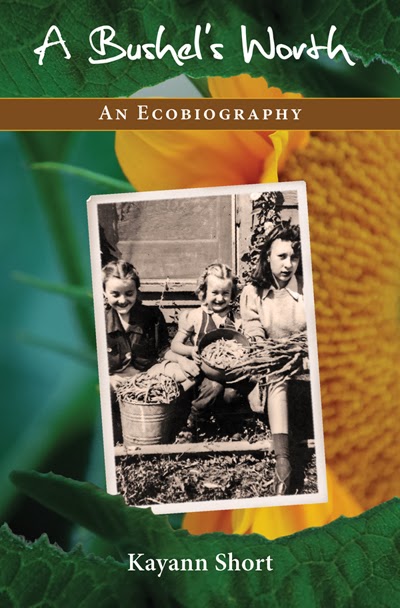This is the first of a two-part article.
by Kayann Short
A journal. Newspaper clippings. My grandmother’s diary. Some
weather reports. I started gathering seeds for A Bushel’s Worth before I knew I was writing a book.
Like all memoirs, mine began with the stories I wanted to
remember, entries recorded in my journal from the day I moved to Stonebridge
Farm, a ten-acre, century-old farm on Colorado’s Front Range. I wasn’t a
consistent journal-keeper, instead noting the most memorable occasions:
wildlife encounters, extreme weather, the vicissitudes of fieldwork, poignant celebrations,
frightening risks, and always, the first day of the New Year.
Those were the stories I wove into a draft of Farmgiving, a term I created to mean
lessons learned from the generosity and bounty of the land on which we grow
vegetables for our community. The idea for the book came to me on a women’s
writing retreat in a wintery Chautauqua lodge. I had already begun one
essay—which became the chapter “Appling,” about our annual apple pressing—and
at the retreat, plotted out eleven other chapters that followed our farm
through one year. I grouped them by season and placed an event at the center of
each. And then I began writing.
It took about a year to finish that first draft, in part
because I wanted to follow the farm through the seasons by capturing the
rhythms of our days. Once finished, I sent query letters to agents who
specialized in nature writing and women’s memoirs. A few asked to see the
manuscript. Their feedback was helpful and accurate: I had written two books.
One, in their words, was a “nuts and bolts” guide to small-scale farming; the
second, a lovely but “quiet” memoir that would be harder to sell in this publishing
era of tragedy, disclosure, and scandal.
While waiting for these responses, I turned fifty and began Pearlmoonplenty, a blog about farming,
food, books, and feminism. Started as a site for writing practice, the blog
became a place to deposit ideas outside the book. Many of these stories came
from my childhood summers on my grandparents’ farms in North Dakota. Some of
them particularly resonated with my readers, whose enthusiasm encouraged me to continue
in that vein. One day, I realized that my book needed to include those early experiences
because they formed my farming roots. I could also show the continuity between
then and now in small-scale farming and draw stronger connections between my
family’s farms and Stonebridge with themes like rural thrift, family legacy,
agricultural preservation, and farm-centered community.
How did Kayann incorporate her experiences in a book? Read the rest of her journey to getting published next Wednesday.
Kayann Short, Ph.D., is the author of A Bushel's Worth: An Ecobiography. She is a writer, farmer, teacher, and activist at Stonebridge Farm, an organic community-supported farm in the Rocky Mountain foothills. Short’s writing has appeared in Pilgrimage Magazine, Colorado Gardener, Redstone Review, Women’s Review of Books, The Bloomsbury Review, Edible Front Range, and various academic journals. Short has taught ecobiography workshops on “Writing the Self in Nature." Read more about Kayann at her website.



1 comment:
Thanks for sharing your journey with us, Kayann!
Post a Comment